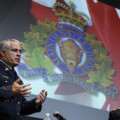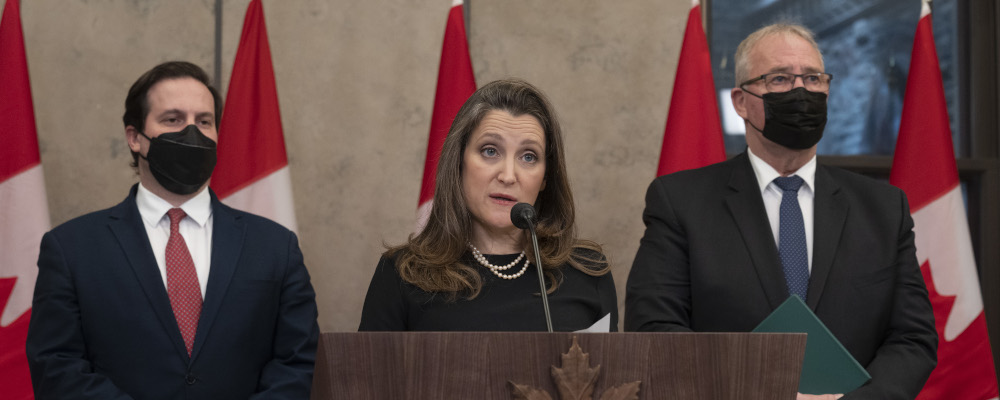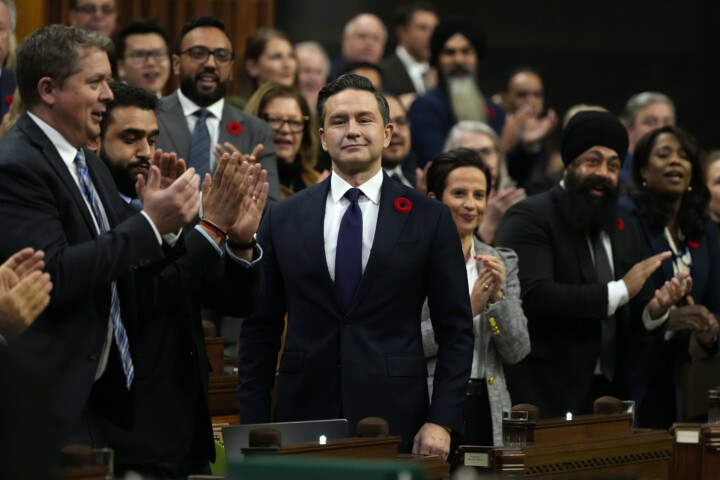For most of history, we have thought about deprivation of liberty in quite literal terms. Short of execution, which Canada hasn’t done in 60 years, locking someone up has been the ultimate state sanction. That is why Pierre Trudeau’s use of the War Measures Act to arrest and jail nearly 500 suspected FLQ sympathizers during the October crisis is remembered as a low point in Canadian history for civil liberties.
Fifty years later, Justin Trudeau seems to have learned from his father’s experience. Tanks in the streets make people uneasy, and filling jails with people who have, at most, an attenuated connection to illegal activity is not a good look. A smidge authoritarian, a tad dictatorial. So, faced with a three-week street protest that clogged downtown Ottawa, Trudeau did not follow his father’s example and call in the army or round up ideological sympathizers. He opted, instead, for less visible tools.
But less visible doesn’t necessarily mean less severe. There’s more than one way to ruin someone’s life. In a Twitter thread that has been liked almost 32,000 times, the anonymous tweeter @punk6529 explained why, in a world of non-custodial money (money that can’t be stashed under your mattress or buried in your backyard), freezing someone’s financial resources effectively locks them out of society. His message is: don’t be fooled into thinking because a non-physical sanction happens somewhere in the unreality of cyberspace that the consequences are similarly virtual. They are very real and very severe.
The move to a cashless society, which has been accelerated by Covid restrictions, makes it almost impossible to function in society without a bank account and a credit card. You can’t purchase many services with cash anymore. When my local coffee shop’s wireless service went down the other day and they couldn’t process digital payments, I offered to pay with cash. They didn’t know what to do. Like many businesses, they simply aren’t set up to handle physical money. And that’s assuming you have large cash reserves to begin with, as you can’t withdraw money from a frozen bank account.
In 1988, when the Emergencies Act became law, you could probably still participate in society, albeit with some inconvenience, without a bank account. Not so in 2022. Now, without a working bank account, you can’t pay for a telephone or internet. You can’t make car payments, rent, or travel. You also can’t exercise most basic rights from freedom of speech to freedom of assembly. You can’t even pay a lawyer to defend you. Think of it as digital jail. There may be no bars, but you are far from free.
We need to adjust our assessment of government action to the realities of our new world. The government doesn’t need to break down your door anymore to effectively remove you from society. They can do it with the press of a button. Doing this to someone—a small business owner in BC, a public servant in Winnipeg, a student in Halifax—who made a small donation to support the convoy is a clear abuse of power. Doing it without due process is as despotic as Pierre Trudeau’s detention of left-wing professors and separatists without charge, trial, or access to legal counsel in 1970.
As during the October Crisis, the lack of legal safeguards on government action increases the likelihood of mistakes. Given that many of the people who donated to the convoy seem to have a less than perfect understanding of the law and of how their donations could be used, doing away with questions of mens rea (guilty intent) and normal burdens of proof means the government can freeze first and ask questions later. By then, it could be too late. A lawyer interviewed by the CBC opined that, in some cases, risk-averse banks “may just decide to shut the person’s account down” without bothering to sort the guilty from the innocent. The long-term consequences of such overreach would be worse than temporary incarceration.
The government’s action is troubling enough, but what should really disturb us is the ease and invisibility with which it is being done. When we can’t see the consequences of government conduct, the risks of government misconduct increases. A government that sends in riot troops to dispel a crowd will rightly pay a price if the police commit abuses. But the diffuse and anonymous nature of financial enforcement mean that sweeping repression can easily go undetected. It is the political equivalent of using drone strikes instead of boots on the ground.
It also drives home just how powerful technology has made governments and the businesses that gatekeep our digital world. When they work together—whether it is to financially de-platform fringe minorities or shut down disfavoured speech—there is literally no way to escape their reach, nowhere to hide. And when they act without due process, there is no way to defend yourself. The same technology that lets us buy dinner with a few clicks from bed also means the government can unperson us with a few clicks from an office in Ottawa.
The fact that weaponizing the financial system against nonviolent protestors and their distant supporters was the government’s tool of first resort should worry anyone who understands the role of civil disobedience in democracy. I would like to think Minister Steven Guilbeault, who was once arrested for scaling the CN Tower to hang a Greenpeace banner, lost a little sleep when he considered that disrupting critical infrastructure is still a common tactic of his environmentalist comrades. But somehow I doubt it. If there is one thing we haven’t seen much of in Ottawa recently, it’s principled consistency.
We don’t yet know how wide the government and the banks will cast their electronic dragnet, but the potential reach is enormous, which means the potential for overreach is significant. For now, all we have to go on are Chrystia Freeland’s statement that “Information is now being shared by law enforcement with Canada’s financial institutions. Financial service providers have already taken action based on that information” and news reports that the banks have begun to execute the government’s orders.
But one thing is already clear: in an interconnected digital world, our freedom depends more than ever on the wisdom, good intentions, and forbearance of government and big business. And that is a chilling thought.
Recommended for You

Are conservatives really rights-deniers?

Decoding the uncertainty in Canada’s oil patch—and what it means for Carney’s investment ambitions

Canadian pluralism will fail if the law is not equally enforced

Why extortion in Canada has surged in B.C., Alberta, and Ontario




